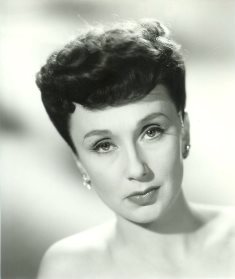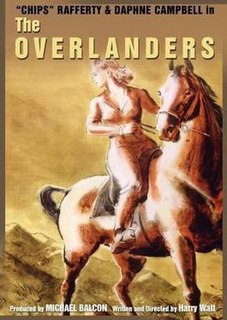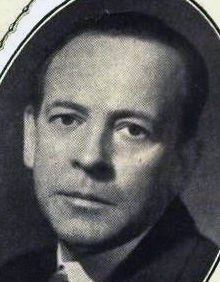Related Research Articles

Friedrich Robert Donat was an English actor. He is best remembered for his roles in Alfred Hitchcock's The 39 Steps (1935) and Goodbye, Mr. Chips (1939), winning for the latter the Academy Award for Best Actor.

Frederick George Peter Ingle Finch was an English-Australian actor of theatre, film and radio.

Georgette Lizette Withers, CBE, AO, known professionally as Googie Withers, was an English entertainer who was a dancer and actress with a lengthy career spanning some nine decades in theatre, film, and television. She was a well-known actress and star of British films during the Second World War and postwar years.

Louis Charles Hayward was a Johannesburg-born, British-American actor.

The Overlanders is a 1946 British film about drovers driving a large herd of cattle 1,600 miles overland from Wyndham, Western Australia through the Northern Territory outback of Australia to pastures north of Brisbane, Queensland during World War II.

Anthony Martin Kimmins, OBE was an English director, playwright, screenwriter, producer and actor.
Ian Dalrymple was a British screenwriter, film director, film editor and film producer.
Leslie Arliss was an English screenwriter and director. He is best known for his work on the Gainsborough melodramas directing films such as The Man in Grey and The Wicked Lady during the 1940s.
Rupert Kathner (1904–1954) was an Australian film director best known for newsreels and low-budget films. He worked with Alma Brooks, an ex-barmaid, who co-produced, operated the camera, edited, co-scripted and acted in their films. Kathner and Brooks were also "shady con artists and fugitives from the law", sometimes described as the "Bonnie and Clyde" of the Australian film industry.
Edward Black was a British film producer, best known for being head of production at Gainsborough Studios in the late 1930s and early 1940s, during which time he oversaw production of the Gainsborough melodramas. He also produced such classic films as The Lady Vanishes (1938). Black has been called "one of the unsung heroes of the British film industry." In 1946 Mason called Black "the one good production executive" that J. Arthur Rank had. Frank Launder called Black "a great showman and yet he had a great feeling for scripts and spent more time on them than anyone I have ever known. His experimental films used to come off as successful as his others."
William Percy Lipscomb was a British-born Hollywood playwright, screenwriter, producer and director. He died in London in 1958, aged 71.

Barry K. Barnes was an English film and stage actor. The son of Horatio Nelson Barnes and Anne Mackintosh Barnes, he was born and died in London. He appeared in sixteen films between 1936 and 1947. He played Sir Percy Blakeney in the 1937 film The Return of the Scarlet Pimpernel. His film career was cut short in 1947 due to an undiagnosable illness contracted during the war. He was married to actress Diana Churchill, and worked with his wife on stage during the 1940s and 1950s, taking West End revivals of The Admirable Crichton and On Approval on profitable tours.
Gregory Raymond Quill was an Australian-born musician, singer-songwriter and journalist. He lived in Hamilton, Ontario, Canada, and was an entertainment columnist at the Toronto Star newspaper from the mid-1980s until his death in May 2013. In Australia he came to popular fame as a singer-songwriter for the country rock band Country Radio (1970–73). Their biggest hit, "Gypsy Queen", co-written by Quill with bandmate Kerryn Tolhurst, was released in August 1972 and peaked at No. 12 on the Go-Set National Top 40. After getting an arts grant, Quill travelled to Toronto in 1974 and by the mid-1980s had become a journalist with the Toronto Star. By 1983 he was married to Ellen Davidson, a public relations executive. Greg Quill died on 5 May 2013, at the age of 66, from "complications due to pneumonia".

Frank Harvey was a British-born actor, producer and writer best known for his work in Australia.

Bush Christmas is a 1947 Australian–British comedy film directed by Ralph Smart and starring Chips Rafferty. It was one of the first films from Children's Entertainment Films, later the Children's Film Foundation.
Below the Surface is a 1938 adventure film set in the coal region of Newcastle, Australia. Only part of the movie survives.
Alec Kellaway (1894–1973) was a South African–born actor best known for his work in Australian theatre and film, notably playing a number of character roles for director Ken G. Hall. He was the brother of Cecil Kellaway. He also worked as a producer in vaudeville and helped run the Talent School at Cinesound Productions.

Claude Flemming (1884–1952) was an Australian actor, writer, producer and director of theatre and film whose varied stage career spanned the first half of the 20th century. He performed in Shakespeare and other drama, as well as opera, and became a music comedy specialist.
William Freshman was an Australian-born actor, scriptwriter and director. He moved to England as a child and worked in the British film industry, writing over 20 screenplays and working as an associate producer at British International Pictures. He also wrote the play The Last of the Ladies.
Nigel Tasman Lovell was an Australian stage, radio, film and television actor, and producer of opera and both stage and radio drama.
References
- ↑ "Ambitious film project by Australians". The Australian Women's Weekly . National Library of Australia. 27 September 1947. p. 40. Retrieved 15 August 2012.
- ↑ Andrew Pike and Ross Cooper, Australian Film 1900–1977: A Guide to Feature Film Production, Melbourne: Oxford University Press, 1998, p178